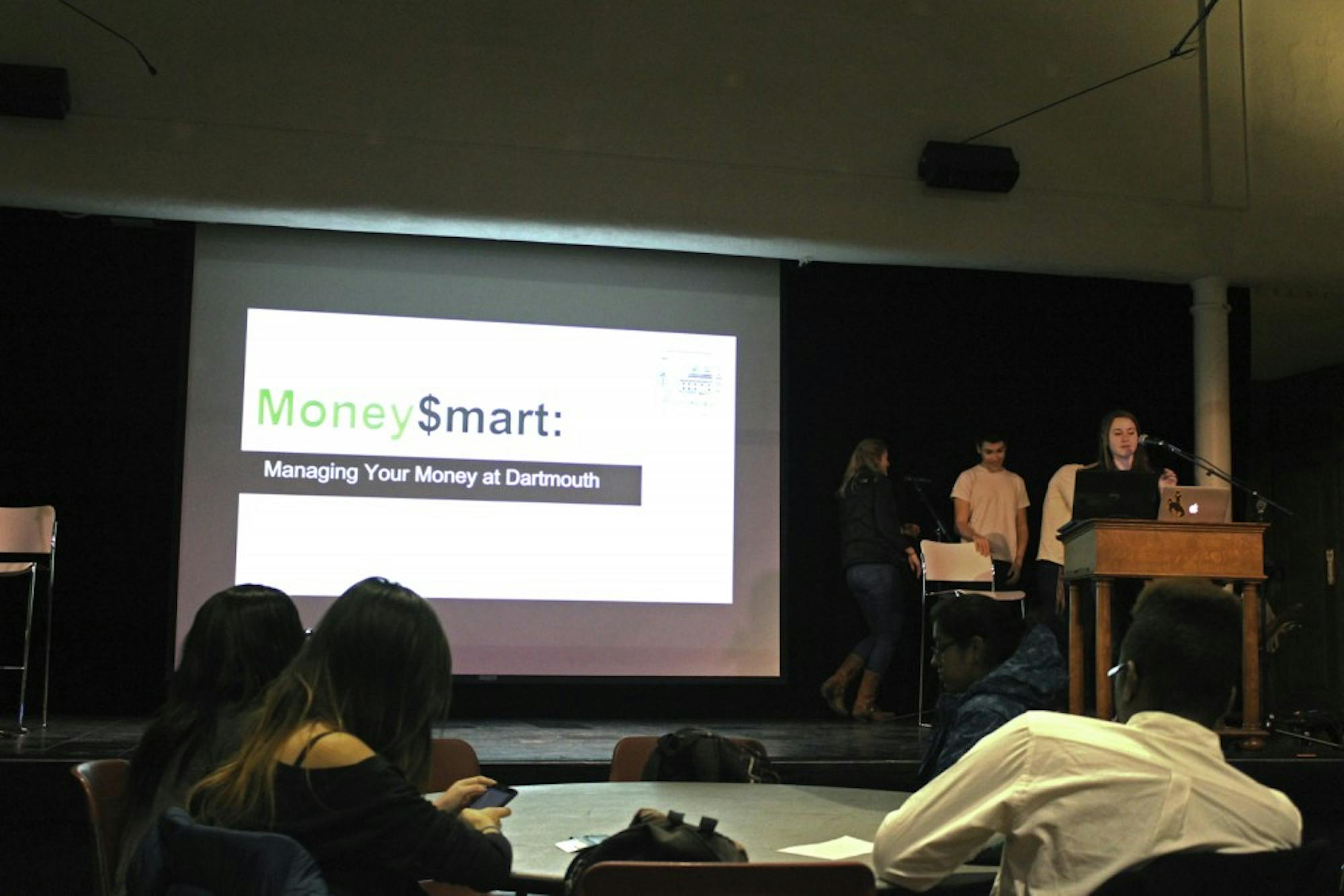In day-to-day life at Dartmouth, where meal swipes and DBA replace cash currency, it can be easy to ignore wealth, Josué Ruíz ’17 said. But off campus, some students can drive their own cars, spend $220 on J. Crew sweater and enjoy a lenient budget while studying abroad.
“I could never do that,” Ruíz said. “I send money back home to my mother in California and need to make sure I have enough saved up so I can go home.”
Ruíz, along with Gabrielle O’Donoghue ’17 and Richard Palomino ’15, spoke at a panel Wednesday night organized by Dartmouth Quest Scholars and MoneySmart.
Arianna Lee ’16, co-director of Quest Scholars, said the group organized the event to present money management skills and personal stories of students working at the College.
Quest Scholars, a chapter of a national network that focuses on bringing high-achieving low-income students to top universities, has around 30 freshman participants this year, social chair Ilenna Jones ’15 said.
“We want to start this dialogue to break the bubble of people who don’t have to worry about getting a job to maintain their current experience,” Lee said.
The College hired approximately 1,700 students this fall, Student Employment Office consultant Kari Jo Grant wrote in an email. About 64 percent of students earn wages between $7.75, campus minimum wage, and $10, Grant wrote.
Speakers highlighted several options for working on campus.
Palomino, who has worked both as a dishwasher for Dartmouth Dining Services and as a teaching assistant, said he made “quick money” at DDS but found the hours less flexible. The teaching assistant position, he said, allowed him to connect with a professor and build his resume.
DDS employs 131 students and the average hourly rate is $11.35, director David Newlove said. Students tend to work between eight and 14 hours a week, he said.
Another large employer, the library, employs on average 225 student employees, associate librarian for user services Jennifer Taxman said.
Most library student employees work technical or service desk jobs, Taxman said. The library, she said, always fills its open positions.
DDS, in contrast, can hire 200 more students per term than it does now, Newlove said. DDS saw a 33 percent decline in the number of student hours worked this term, he said, adding that “jobs tend to be shed” during finals.
“We have many job openings that go unfilled,” Newlove said. “So we’re seeing less students who want to work, even though we’ve increased by $2 an hour since last year.”
Newlove noted that the majority of students who work for DDS are women and people of color.
During the panel, Ruíz said some difficulties that students of lower socioeconomic status face stem from stigma attached to minorities in food services.
“I saw a Yik Yak the other day that was saying, ‘Where are the people of color so I can make my Novack order,’” Ruíz said.
Students of lower socioeconomic status may have fewer networking opportunities and visible role models — experiences that many people assume are available to everyone, Ruíz said.
“It creates an awkward conversation where I have to explain to you how I have nothing you just talked about, and you have to acknowledge your privilege,” he said.
Jones said she believes many people do not talk about money because they do not want to advertise the extra work they do.
The panel and similar events acknowledge the contributions of student employees, who balance tough courses, social life and a job, Jones said.
“There are students working here who are helping to run Dartmouth and making it work,” Jones said.
As a pre-medical student, O’Donoghue said she does not have time for a full-time job. Instead, she makes money in temporary jobs: baby-sitting, tutoring and participating in research studies.
While events like the panel give students of lower socioeconomic status a space in an elite institution, the College could do more, Jones said.
“We’re making sure students who come here have a space,” Jones said. “Schools like this are not historically made for students like me.”
Lyric Griffin ’18, who attended the event, said she appreciated the opportunity to hear students talk about an experience that resonated with her own.
Sofia Karabasevic ’16, co-chair of MoneySmart, a Tucker Foundation program that promotes financial literacy, said the group’s presentation aimed to show the technical side of managing personal finances.
The group also spoke about Dartmouth-specific job search sites like JobNet, the temporary jobs Listserv and psychological and brain sciences departmental experiments.
Janice Fidalgo ’18 said she attended to learn about campus jobs and budget management. After the discussion, Fidalgo said that she appreciated hearing about opportunities like the studies, and feels more confident about using money management tools.
Jones said she is grateful for the opportunities she has at Dartmouth but believes campus could better support students who have trouble adjusting to a historically wealthy environment.
On campus, she said, small interactions can “fly right in your face.” She said that as someone who comes from a place where she dealt with hunger, the Class of 1953 Commons “is the best.”
“People would say this food is disgusting, and I couldn’t really say, ‘Hey, I like FoCo,” Jones said. “Those little things that one could think isn’t a big deal may be a bigger deal for someone else.”
Priya Ramaiah contributed reporting.




